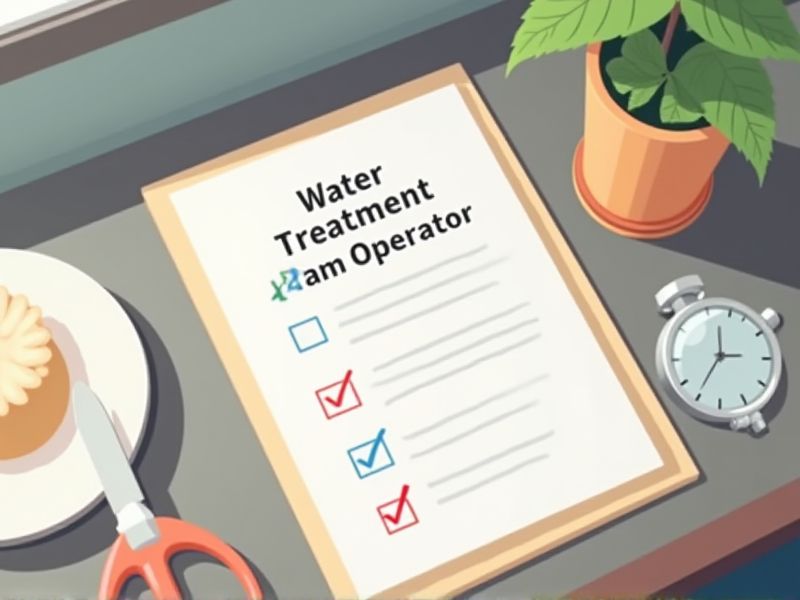
Water treatment plant operators require certain certifications to ensure they have the competencies necessary to maintain public health and safety by managing water quality standards effectively. Certifications validate that operators understand regulatory compliance with environmental and health guidelines crucial for safe water management. They also equip operators with the necessary skills for handling advanced water treatment technologies, which mitigate risks of contamination. Key certifications to consider for becoming a water treatment plant operator include those that address these critical competencies.
Certified Water Treatment Plant Operator
A Certified Water Treatment Plant Operator ensures compliance with safety and regulatory standards, which is crucial for public health. Certification validates an operator's knowledge and skills in managing complex systems within water treatment facilities. Experienced operators with certification are better equipped to handle emergencies and maintain operational efficiency. Certification also instills public confidence in the water quality provided by the facility.
Safe Drinking Water (SDW) Operator Certification
Certification ensures that water treatment plant operators possess the necessary knowledge and skills to safely manage and operate water systems. Unsafe or improperly treated water can lead to serious health issues like waterborne diseases. Regulatory agencies require certification to maintain consistent safety and quality standards across water facilities. Certified operators help build public trust by ensuring that the community receives safe, clean drinking water.
Wastewater Treatment Operator Certification
Wastewater Treatment Operator Certification is needed because it ensures that operators have the knowledge to manage and treat wastewater effectively, reducing environmental pollution. Certified operators are trained to handle complex systems and equipment, preventing potential failures. Regulatory compliance requires operators to be certified to uphold health and safety standards. Certification validates the operator's expertise, instilling public confidence in the safety of treated water.
Laboratory Analyst Certification for Water Quality
Certification ensures that water treatment plant operators possess the necessary skills to accurately analyze and maintain water quality, preventing contamination risks. Regulated standards require certified professionals to ensure compliance with environmental and public health guidelines. Inadequate assessment by untrained personnel may lead to health hazards and legal liabilities. Certification improves the reliability and effectiveness of water treatment processes.
Distribution System Operator Certification
The Distribution System Operator Certification ensures that Water Treatment Plant Operators possess the necessary skills to maintain and oversee the water distribution network efficiently. Proper certification minimizes the risk of water contamination by confirming that operators are knowledgeable in both regulation and technology management. These qualifications help in the rapid identification and resolution of distribution problems, safeguarding public health. The certification process also incentivizes ongoing education and adaptation to evolving industry standards and innovations.
HAZWOPER Certification
HAZWOPER Certification is required for Water Treatment Plant Operators due to the potential exposure to hazardous substances during operations. This certification ensures operators have the necessary knowledge to handle and manage chemical spills and waste safely. Compliance with OSHA standards reduces the risk of workplace incidents and environmental contamination. Having certified operators enhances public trust and operational efficiency by meeting regulatory requirements.
OSHA 10/30-Hour Certification
The OSHA 10/30-Hour Certification ensures water treatment plant operators understand and adhere to health and safety standards, reducing the risk of workplace accidents. Enhanced knowledge obtained from the certification facilitates compliance with regulatory requirements, improving operational efficiency. Through comprehensive training, operators gain skills to identify and mitigate potential hazards, promoting a safer work environment. Employers often mandate the certification to decrease liability and enhance safety accountability among employees.
Confined Space Entry Certification
Confined space entry certification ensures that water treatment plant operators understand the inherent risks associated with limited access areas, like tanks or vaults, which often contain hazardous substances or inadequate ventilation. Understanding these risks reduces the likelihood of accidents and exposure to toxic chemicals during routine maintenance or repairs. Proper training equips operators with the skills to use safety equipment effectively, thus minimizing potential health hazards. Certification also ensures compliance with safety regulations, protecting both the employees and the facility from legal and operational repercussions.
First Aid/CPR Certification
First Aid/CPR certification is crucial for water treatment plant operators due to their role in maintaining a safe working environment amidst potential chemical hazards and operational accidents. The certification ensures operators can provide immediate assistance during medical emergencies, minimizing workplace injury impacts. The capability to quickly respond to such incidents effectively aligns with occupational safety standards mandated by industry regulations. Training enhances their preparedness, contributing to overall plant safety and operational resilience.
Environmental Management Systems (ISO 14001) Certification
ISO 14001 certification helps water treatment plant operators maintain consistent environmental performance by ensuring adherence to international environmental management standards. The certification also assists in systematic identification and reduction of environmental impacts, leading to enhanced regulatory compliance. Stakeholders often demand transparency in environmental practices, and having this certification can boost public confidence in the plant's operations. ISO 14001 encourages continual improvement, which drives efficiency in resource use and waste management within the plant.
Summary
By obtaining certifications, you enhance your expertise and credibility, leading to improved job opportunities and career advancement. Certifications demonstrate your commitment to industry standards, resulting in higher trust from employers and colleagues. As you apply advanced techniques learned through certification, the plant operates more efficiently, benefiting the community with cleaner water. This continuous learning and skill development can also contribute to higher job satisfaction and potential salary increases.
